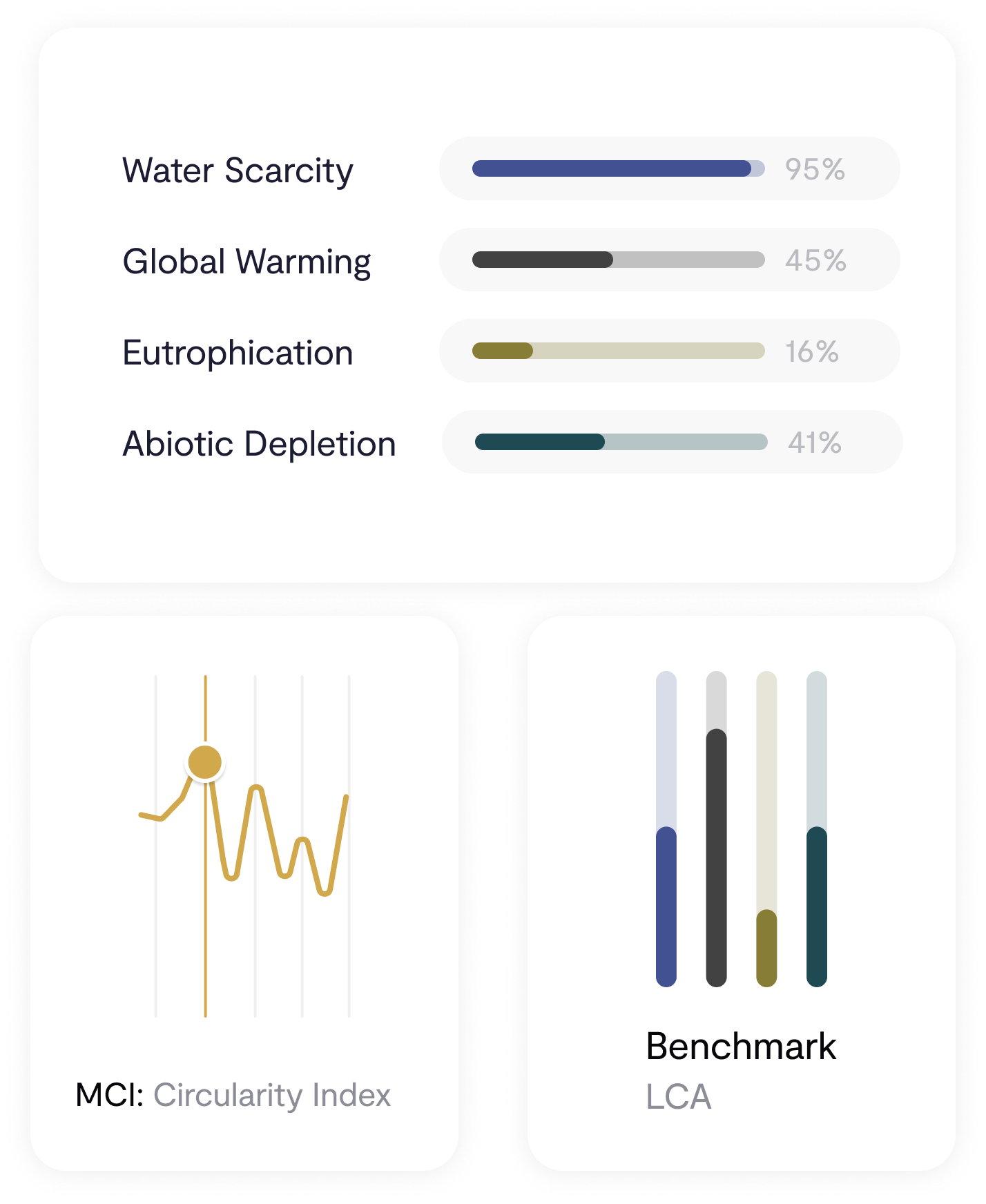As a professional in the fashion industry, especially if you are involved in sustainability, you have likely heard more and more about Life Cycle Assessment or at least about measuring environmental impact in the textile sector. This approach is gaining popularity for a simple reason: LCA provides a comprehensive perspective on how to reduce the environmental impact of your products. In this article, we explain why it is crucial for your fashion business to adopt LCA and how this tool can help you make more sustainable decisions, reducing both environmental impact and associated costs.
Fashion companies have the responsibility to reverse the unsustainable situation for both the planet and the industry itself
In the last 20 years, the fashion industry has significantly increased its production volume, creating items that are worn infrequently and of which only about 13% of the materials are recycled after use. Most of the discarded clothing ends up in landfills or is incinerated, further intensifying the industry’s impact on climate change. This uncontrolled growth in production and waste is closely tied to environmental degradation. Fashion companies have a responsibility to reverse this unsustainable situation for both the planet and the industry itself.
To understand their impact and take corrective measures, fashion brands must enforce transparency in their supply chain through data: what cannot be measured does not exist. The only way to report progress is through measurement, to understand where we are and how we are advancing towards established goals.
As the fashion industry faces upcoming sustainability regulations, Life Cycle Assessments are becoming increasingly important. The Directive on Green Claims and similar regulations prioritize LCA as the main tool for obtaining accurate impact data. At BCome, we rely on data rather than intuition to provide resources and solutions that enable textile companies to create honest products that respect nature while also enhancing their competitive edge.
For those who are not yet familiar with the potential of Life Cycle Assessment, its primary function is to quantify environmental impacts throughout a product’s life cycle. The main feature of this tool is its comprehensive approach. Instead of examining each process in isolation, LCA analyzes all the processes that make up a product’s life cycle, providing a holistic view of its environmental impact.
In the fashion industry, LCA serves as a versatile solution, helping companies understand environmental impacts and promoting sustainability. At BCome, we have established these objectives for our LCA tool:
- Help understand the environmental impacts associated with production compared to industry standards.
- Facilitate quick assessments of entire collections and product comparisons following international guidelines.
- Provide easily interpretable environmental indicators to identify areas for improvement.
- Empower consumers with credible sustainability data.
- Combat greenwashing and clarify concepts related to sustainability.
- Address significant environmental challenges within the fashion industry, including global warming, water scarcity, eutrophication, and the depletion of abiotic resources.
However, it is important to highlight that these objectives may not necessarily apply universally to all Life Cycle Assessments. Each company should define its own goals based on its specific needs.
Moreover, the versatility of LCA allows it to be used across several departments within a textile company for a wide range of purposes:
Enhanced product development
Having specific metrics and indicators for each item in a collection allows for the implementation of actions based on quantitative criteria aimed at reducing and eliminating the negative impacts of products at various stages of their life cycle. Identifying the most harmful stages for the planet is the first step toward creating garments with improved environmental performance.
“The main benefit of calculating the environmental impact of our products throughout their life cycle is to improve materials and products with the worst impact. Sharing information among suppliers encourages better practices and materials”
Fernando Nuñez Diaz, Head of Production at HOFF
More efficient production and waste management processes
LCA provides a comprehensive view of environmental impacts across all stages of a product’s life cycle, extending beyond just manufacturing. This holistic approach offers a clearer understanding of the true consequences of the system, identifying areas for focus and guiding specific actions to mitigate associated environmental risks. Additionally, it enhances supply chain efficiency by addressing environmental issues early on, preventing them from spreading into later stages.
“Assessing our environmental impact helps us gain greater self-awareness, giving us complete visibility over the entire value chain. This translates into transparency with our customers, as we share all the information with them, which helps build trust”
Marta Losada De Fuentes, Senior Buying & Sustainability at Scotta 1985
Higher environmental performance and profitability
Understanding the detailed impact of each stage in your value chain enables you to make decisions that optimize not only your environmental footprint but also the budgets allocated to each stage
Life Cycle Assessment allows working with a large amount of environmental data and information, making it possible to identify opportunities and critical points along the supply chain clearly and precisely. Thus, LCA, in addition to serving as a tool for environmental protection and resource conservation, has significant potential to reduce costs and improve the competitiveness of a fashion company due to its holistic approach. Understanding the detailed impact of each stage in your value chain enables you to make decisions that optimize not only your environmental footprint but also the budgets allocated to each stage.
“Thanks to the LCA results of our products, we became aware of the impact generated by our products made with virgin – recycled cotton yarn. For this reason, we decided to look for an alternative to replace virgin cotton, which consumes a lot of water and pesticides, with organic one”
Claudia Ermini, Sustainability & Innovation Specialist at Rifò
Better communication with the end customer
LCA translates a product’s life cycle into valuable environmental data that can be communicated to the end customer. As a result, this tool can be seamlessly integrated into a company’s marketing strategy to promote transparency with consumers. By leveraging the information provided by an LCA, a fashion brand can strengthen its communication with accurate data that supports its environmental commitment. This aligns with the goals of European directives aimed at preventing greenwashing, ensuring that companies back their environmental claims with specific data and demonstrate their connection to sustainability.
“A major advantage of calculating the environmental impact of our products throughout their life cycle is to convey this information to the end consumer so that they can appreciate it, just as they value the environmental impact of a new household device or food products”
Jorge Mataix, General Manager at Belda Lloréns
Great anticipation to legislative requirements
In recent years, legislation related to the textile sector has focused on a systemic shift towards sustainability, aiming to minimize environmental and social impacts. Legislation will be the driving force for the fashion industry to progress towards sustainability, and with LCA being the primary tool recommended by policymakers for assessing company impacts, this resource becomes the ultimate solution to help fashion companies meet the requirements set by new regulations.
“Environmental impact assessment provides us with a comprehensive and holistic understanding of each of our products, enabling us to make better decisions in design, production processes, and business planning. This allows us to continuously improve, educate our consumers with specific metrics, avoid greenwashing, and achieve our established goals”
Patricia Bori, Product & Sustainability Specialist at SAYE
Life Cycle Assessment enables fashion companies to create value. As the industry moves towards a more sustainable future, LCA emerges as a foundation for informed decision-making, fostering innovation and strengthening relationships with stakeholders.
If your fashion company is interested in conducting a Life Cycle Assessment and doesn’t know where to start, or if gathering and evaluating information has become a challenge for your business, BCome is your trusted partner for the support you need to ensure the accuracy of the results. We look forward to hearing about your needs, shall we talk?









